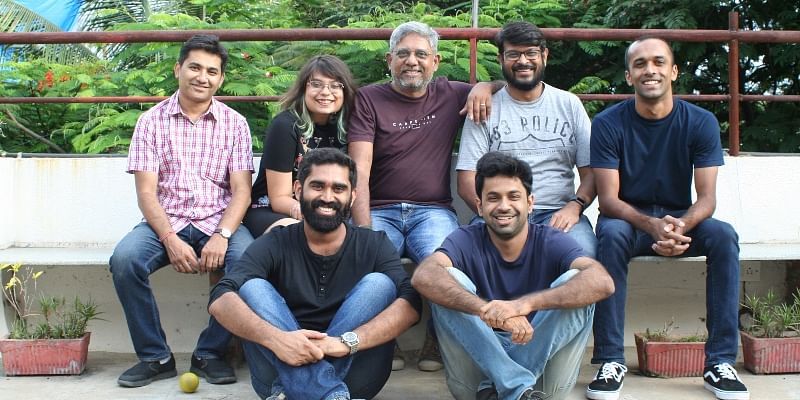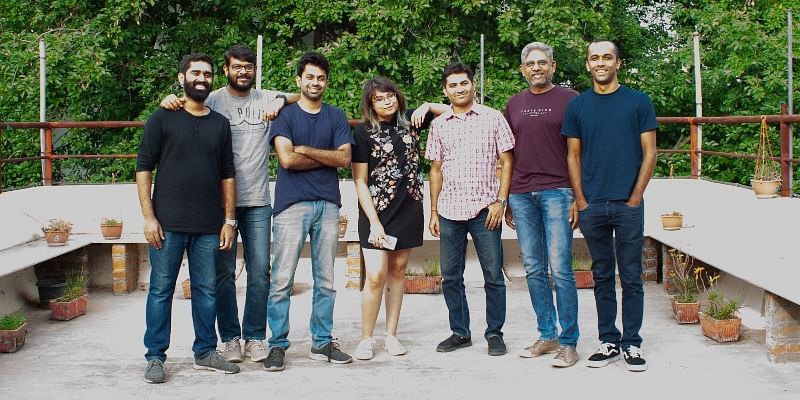The COVID-19 pandemic has hit many industries and businesses hard. Retailers and manufacturers have been particularly facing several challenges as clothing, footwear, and other fashion items did not see many takers during the lockdown period.
Being the world’s second largest footwear producer, the onset of COVID-19 pandemic sent India’s footwear industry off track, owing to weak consumer sentiment and drop in revenues, etc.
During this period, Flatheads, an online only men’s footwear brand founded by Utkarsh Biradar and Ganesh Balakrishnan in 2018, was hit by the COVID-19 imposed lockdown.
While the larger players in the space themselves were hit hard, for a startup with limited funds, it was a matter of survival.
From focusing on semi-casual and casual styles earlier, the Bengaluru-based fashion commerce startup quickly repositioned itself as an all-day comfort sneakers to survive the crisis. It also diversified its offering by procuring and selling masks to stay afloat in these trying times.
“People are mostly working from home these days, and so work-appropriate dressing is not really the primary use case anymore. But their active lifestyle of everyday walking during on-call meetings, staying fit with brisk walks and jogs, moving in their two-km radius to do everyday shopping, etc., has increased in recent times. And our sneakers are perfect for those use cases too,” explains Ganesh.

The Flathead team in January 2020
From then till now
After selling their mobile payments startup Momoe to ecommerce company ShopClues four years ago, Utkarsh Biradar and Ganesh Balakrishnan decided to start up again.
Armed with experience in the B2C ecommerce and consumer behaviour, the duo started looking closely into the footwear market and started Flatheads in 2018, with a focus on semi-casual and casual styles.
Ganesh says the plan before the pandemic was to grow its core business of casual sneakers and build upon its initial traction by launching follow-up product lines with technological innovations.
When the COVID-19 lockdown happened, the team was ramping up its marketing budgets and optimising its return on ad spends. “We had also invested in doing roadshows across workplaces like IT parks and co-working spaces across the top cities,” says Ganesh.
“The lockdown was a shock to the system since we couldn’t deliver any online orders and our roadshows came to a complete halt,” he adds.
Using the lockdown as an opportunity
The team used the lockdown period to evaluate its business strategy and decided to take a three-step approach.
Survive in the immediate term: Ganesh says the team reduced its discretionary spends. They also communicated proactively to the customers about the delay in delivering orders.
He says, “One of our customers from Hyderabad waited for two whole months and never lost his cool. Another customer ordered a pair for her husband, a sailor, who was leaving for seven months right after the lockdown. We tracked their order every day, and were able to deliver within the promised timeframe, despite their location being in a containment area. There were also phases where our delivery partners were understaffed, or completely shut for a week, and our team got together and delivered orders in their own vehicles across Bengaluru.”
Being opportunistic: Ganesh says, the need of the hour was safety accessories, and the suppliers had the capability to make high quality masks. Hence, the team started procuring masks as they were essential goods, and this helped to hold up their revenues in April and May.
Focus on the core business: “We put all our efforts in creating the next line of shoes with a product USP, and also invested in building an integrated brand identity and unique positioning,” says Ganesh.
So, after the lockdown in June, the team was able to define its target audience and experimented with different marketing approaches, and it started paying off.

Early Flatheads team
Focus on customer experience
The team also decided to focus on selling only through its website. According to them, this helped focus on telling a sharper story to their audiences and bring in focus on marketing, sales, and post-sales support to create customer delight.
The end strategy was always to provide the best customer experience, and a lot of customers appreciated the effort. Many of them even bought the footwear at full-price at a time when most brands were either barely getting any orders or were offering huge discounts to survive.
The team clocked a GMV of Rs 10 lakh in March 2020, whereas in June and July it crossed Rs 20 lakh each month.
“We’ve crossed Rs 1 crore in 10 months since launch. A lot of our customers came back to order a second or even a third pair, and we opened more customer communications channels, started having direct one-to-one conversations with our customers, and fixed issues in real-time,” explains Ganesh.
Currently, the starting price of a Flatheads pair of shoes is Rs 2,500, and goes up to Rs 3,500. The team has been focussed on its first 25 SKUs. They launched 13 SKUs in November 2019 and two more in December 2019.
“One of the big mistakes we made at Momoe was to begin with the discounting game everyone was following. Cliched as it sounds, throwing money doesn’t guarantee loyalty. There was a time we were offering free beer to those who signed up and that was a big mistake. There has to be a prime value and we have corrected that,” recollects Utkarsh.
Bringing the supply chain to India
For Flatheads, the next step was to focus on the supply chain. As the international supply chain was disrupted during the lockdown, the manufacturing was outsourced to vendors in China, as the polyester mix that the team is building now is hard to manufacture in India in small volumes.
The team viewed the lockdown as an opportunity to build its local supply chain in India.
“Our product and sourcing team has been working hard and has built a robust supplier base that will help us create unique shoes and grow quickly in the coming months,” says Ganesh.
Logistics, however, has been challenging since there are multiple containment zones and they keep changing every day. The founders themselves have been taking up customer support calls and the entire team has been delivering orders when the logistics partners haven’t been able to.
“We are doing whatever it takes to keep our customers happy, and they have helped us in return with referrals and repeat orders. We also took note of the existing gaps in logistics, and our operations team spent the time during lockdown addressing and fixing them,” says Ganesh.
The market and future
According to IBEF, the men’s footwear as a category is believed to be worth Rs 8,000 crore, and is growing at a CAGR of 20 percent.
Former Satya Paul Co-founder, Jyoti Mohan Narula, has also started a footwear brand for men called Joe Shu. Apart from that, men’s-only brands like Socksbakery, XXYY, and Marico-acquired Beardo are fast growing.
The Flatheads team has raised angel funding of $500,000 from Pankaj Chaddah, Co-founder, Zomato; and Sahil Barua, Co-founder, Delhivery. An ecommerce trend report released by Unicommerce says the online sale percentage in India is at 4.5 percent as compared to China’s 15 percent. The global average is 14 percent.
"The focus on online channel post COVID has provided impetus to the online sales of brands and retailers, and the share of business from online is expected to grow 4-5x during festive days compared to pre-COVID levels for these brands," explains a consultant at RedSeer.
The consultant further added in a report that fashion category will see higher growth rate as horizontals look to increase its fashion portfolio through its private label which also drive significant margins.
Abhinav Singh, Directo, Amazon Transportation Services, says, there is a lot more trust in transactions online, and people are starting to realise they don’t have to make a trade-off between lifestyle choices and safety.
“There is a push of Indian languages, video pushes, and ways in which delivery firms are working with brands to ensure that orders reach on time. This has made ecommerce easy to adopt,” an analyst says.
With the opening up of non-essential ecommerce, the sale of online fashion and accessories has seen a surge of 26 percent. In India, ecommerce as a sector has seen order volumes grow by 20 percent; GMV saw a rise of close to 23 percent with an average order value of Rs 1,100.
“We now have our new lineup of sneakers that are unique in design and have cutting-edge technological innovations that will help us take a differentiated position as a path-breaking sneaker brand. We are excited to see what the festive season response will be with the new sneaker line-up and new brand identity,” says Ganesh.
Edited by Megha Reddy
Link : https://yourstory.com/2020/10/mens-online-footwear-startup-flatheads-pandemic-sales
Author :- Sindhu Kashyaap ( )
October 22, 2020 at 05:10AM
YourStory



